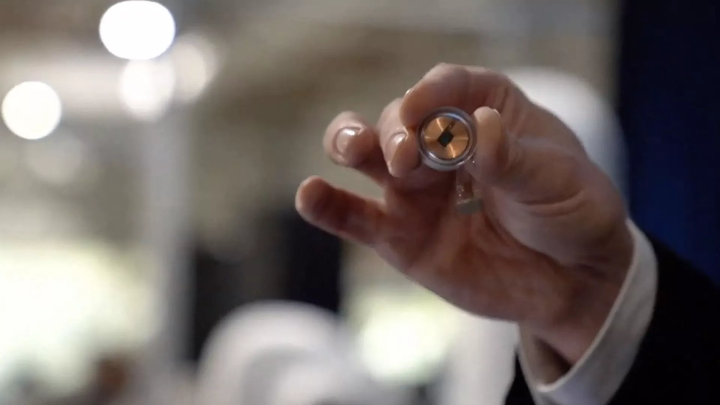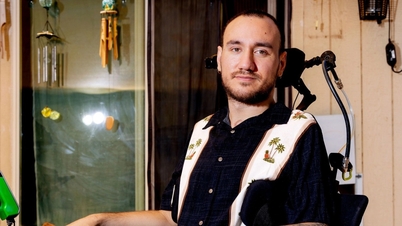According to Sputnik , Neuralink's ambitious goal is to create a seamless connection between the human brain and computers, allowing individuals to communicate and interact with machines in an unprecedented way.
Billionaire Elon Musk has repeatedly claimed that Neuralink's research is a breakthrough development for the field of neurotechnology.
Neuralink is aiming to develop a chip with high throughput that can be implanted into the human brain, creating two-way communication between the user's mind and external electronic devices.

A brain-attached chip model developed by Neuralink was introduced by billionaire Elon Musk in 2020. (Photo: Neuralink)
The FDA's approval of Neuralink's human trials shows significant confidence in Neuralink's technology, and its potential to revolutionize the lives of people with neurological diseases and disabilities.
While the road to this milestone has been rocky for Neuralink, the company has shown promising results in preclinical studies, paving the way for moving toward human trials.
If successful, this advanced technology could revolutionize many different fields, including health care, communications and human-computer interaction.
Potential applications of implanting chips into the human brain include helping people with neurodegenerative disorders such as Parkinson's or Alzheimer's disease to enhance their cognitive and information processing abilities.
However, the road ahead for Neuralink is still full of challenges, as legal and ethical limitations have yet to be resolved. In which Neuralink must ensure the safety, privacy and informed consent of the participants who will participate in the trial.
Additionally, the technology will need to undergo rigorous monitoring to meet strict regulatory standards before it can be widely available.
The FDA approval of Neuralink for human trials is a significant step forward in realizing the potential of human-machine communication technology. The decision marks a major milestone for Neuralink and paves the way for potentially transformative advances in the field of brain-computer interfaces (BCIs).
Tra Khanh (Source: Sputnik)
Useful
Emotion
Creative
Unique
Source



![[Photo] General Secretary To Lam, Secretary of the Central Military Commission attends the 12th Party Congress of the Army](https://vphoto.vietnam.vn/thumb/1200x675/vietnam/resource/IMAGE/2025/9/30/9b63aaa37ddb472ead84e3870a8ae825)
![[Photo] Panorama of the cable-stayed bridge, the final bottleneck of the Ben Luc-Long Thanh expressway](https://vphoto.vietnam.vn/thumb/1200x675/vietnam/resource/IMAGE/2025/9/30/391fdf21025541d6b2f092e49a17243f)
![[Photo] Solemn opening of the 12th Military Party Congress for the 2025-2030 term](https://vphoto.vietnam.vn/thumb/1200x675/vietnam/resource/IMAGE/2025/9/30/2cd383b3130d41a1a4b5ace0d5eb989d)
![[Photo] President Luong Cuong receives President of the Cuban National Assembly Esteban Lazo Hernandez](https://vphoto.vietnam.vn/thumb/1200x675/vietnam/resource/IMAGE/2025/9/30/4d38932911c24f6ea1936252bd5427fa)
![[Photo] The 1st Congress of Phu Tho Provincial Party Committee, term 2025-2030](https://vphoto.vietnam.vn/thumb/1200x675/vietnam/resource/IMAGE/2025/9/30/1507da06216649bba8a1ce6251816820)





























































































Comment (0)